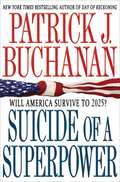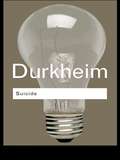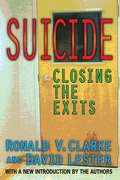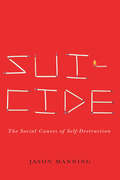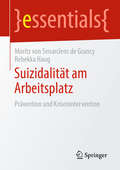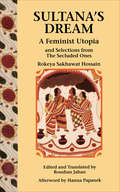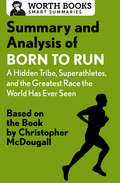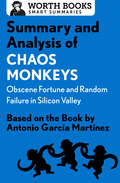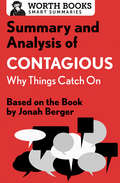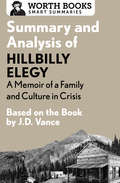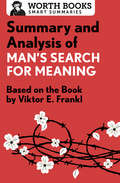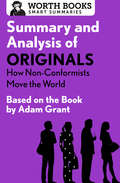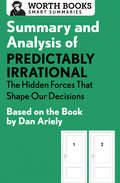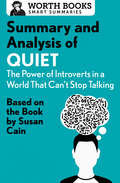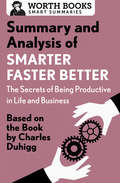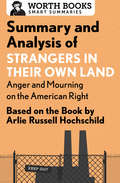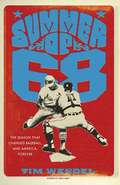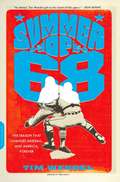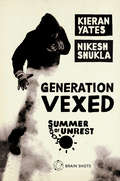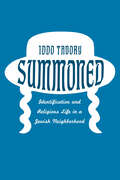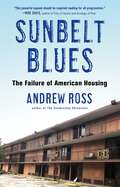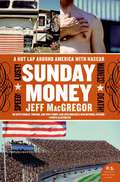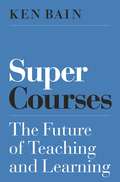- Table View
- List View
Suicide of a Superpower: Will America Survive to 2025?
by Patrick J. BuchananThe book exposes the risks America faces today and what those dangers will mean for the country's future, and warns against not only the dangers that the country faces under Obama, but also the risk of sliding into irrelevancy that the Republican party faces if it chooses to forget its core values.
Suicide: A Study in Sociology
by Emile DurkheimThere would be no need for sociology if everyone understood the social frameworks within which we operate. That we do have a connection to the larger picture is largely thanks to the pioneering thinker Émile Durkheim. He recognized that, if anything can explain how we as individuals relate to society, then it is suicide: Why does it happen? What goes wrong? Why is it more common in some places than others? In seeking answers to these questions, Durkheim wrote a work that has fascinated, challenged and informed its readers for over a hundred years. Far-sighted and trail-blazing in its conclusions, Suicide makes an immense contribution to our understanding to what must surely be one of the least understandable of acts. A brilliant study, it is regarded as one of the most important books Durkheim ever wrote.
Suicide: Closing the Exits
by Ronald V. ClarkeSuicide prevention is a major goal of the Public Health Service of the US government. This has been the case since the 1960s when the National Institute of Mental Health established a center for the study and prevention of suicide. Since then, however, the knowledge and research gathered has not bought about the reduction of suicide. Suicide: Closing the Exits was written to change this trend.This book reports a program of research concerned with preventing suicide by restricting access to lethal agents, such as guns, drugs, and carbon monoxide. It may seem implausible that deeply unhappy people could be prevented from killing themselves by "closing the exits," but the idea is not a new one and has been discussed widely in the literature.The authors argue that restricting access to lethal agents should be considered a major preventive strategy, along with the psychiatric treatment of depressed and suicidal individuals and the establishment of suicide prevention centers to counsel those in crisis. Suicide represents a major contribution to the literature. As such, it should be read by all medical practitioners, policy makers, and psychologists.
Suicide: The Social Causes of Self-Destruction (Studies in Pure Sociology)
by Jason ManningThe conventional approach to suicide is psychiatric: ask the average person why people kill themselves, and they will likely cite depression. But this approach fails to recognize suicide’s social causes. People kill themselves because of breakups and divorces, because of lost jobs and ruined finances, because of public humiliations and the threat of arrest. While some psychological approaches address external stressors, this comprehensive study is the first to systematically examine suicide as a social behavior with social catalysts.Drawing on Donald Black’s theories of conflict management and pure sociology, Suicide presents a new theory of the social conditions that compel an aggrieved person to turn to self-destruction. Interpersonal conflict plays a central but underappreciated role in the incidence of suicide. Examining a wide range of cross-cultural cases, Jason Manning argues that suicide arises from increased inequality and decreasing intimacy, and that conflicts are more likely to become suicidal when they occur in a context of social inferiority. As suicide rates continue to rise around the world, this timely new theory can help clinicians, scholars, and members of the general public to explain and predict patterns of self-destructive behavior.
Suizidalität am Arbeitsplatz: Prävention und Krisenintervention (essentials)
by Moritz von Senarclens de Grancy Rebekka HaugDas essential bespricht Aspekte des Suizidrisikos im Unternehmen und stellt Präventionsmaßnahmen und Maßnahmen zur Krisenintervention vor. Der Autor und die Autorin führen Techniken wie das Containing ein und diskutieren den Umgang mit emotionalen Reaktionen wie Hoffnungslosigkeit, Ohnmachtsgefühle oder Autoaggressivität. Psychoanalytisches Hintergrundwissen und ein kulturgeschichtlicher Überblick zum Suizid bereichern den Band. Besondere praxisrelevante Aspekte sowie rechtliche Fragen zum Suizid am Arbeitsplatz runden die Einführung ab.
Sultana's Dream: And Selections from The Secluded Ones (A\feminist Press Sourcebook Ser.)
by Rokeya Sakhawat Hossain Hanna Papanek Roushan JahanSultana's Dream is a witty, skillful and appealing tale that posits a world in which women have taken over the public sphere and men are confined to the private hidden world of seclusion. "A gem of a book...it speaks to us of the complexity of trying to understand women of other cultures and times in their own terms."--Geraldine Forbes, Committee
Summary and Analysis of Born to Run: Based on the Book by Christopher McDougall
by Worth BooksSo much to read, so little time? This brief overview of Born to Run tells you what you need to know—before or after you read Christopher McDougall’s book. Crafted and edited with care, Worth Books set the standard for quality and give you the tools you need to be a well-informed reader. This short summary and analysis of Born to Run by Christopher McDougall includes: Historical contextChapter-by-chapter overviewsDetailed timeline of key eventsImportant quotesFascinating triviaGlossary of termsSupporting material to enhance your understanding of the original work About Born to Run by Christopher McDougall: Christopher McDougall’s New York Times–bestselling Born to Run brought the underground sport of distance running to the forefront of American conversation, spurring trends like barefoot running and chia seeds’ recognition as a superfood. Centering around two long-distance races, the second of which McDougall intends to run, the book is written in a distinctly Gonzo journalism–style. The author focuses on the Tarahumara, an ancient tribe of runners that lives isolated in Mexico’s Copper Canyons, but he also pulls in plenty of other characters, past and present, and explores the biological reasons we are all born to run. The summary and analysis in this ebook are intended to complement your reading experience and bring you closer to a great work of nonfiction.
Summary and Analysis of Chaos Monkeys: Based on the Book by Antonio García Martinez
by Worth BooksSo much to read, so little time? This brief overview of Chaos Monkeys: Obscene Fortune and Random Failure in Silicon Valley tells you what you need to know—before or after you read Antonio García Martínez’s book. Crafted and edited with care, Worth Books set the standard for quality and give you the tools you need to be a well-informed reader. This short summary and analysis of Chaos Monkeys by Antonio García Martínez includes: Historical contextChapter-by-chapter overviewsCharacter profilesImportant quotesFascinating triviaGlossary of termsSupporting material to enhance your understanding of the original workAbout Chaos Monkeys: Obscene Fortune and Random Failure in Silicon Valley by Antonio García Martínez: Chaos Monkeys is an autobiographical account of Antonio García Martínez’s time in the exploding IT start-up scene in California, and his work as Facebook’s marketing manager. He offers a scathing and hilarious analysis of the landscape of contemporary social media. Based on his own experience and observations, Martínez unpacks the problems of funding and developing new tech companies, and the even greater problems of working for a large, up-and-coming corporation run by a visionary—who isn’t necessarily in it for the money. The summary and analysis in this ebook are intended to complement your reading experience and bring you closer to a great work of nonfiction.
Summary and Analysis of Contagious: Based on the Book by Jonah Berger
by Worth BooksSo much to read, so little time? This brief overview of Contagious tells you what you need to know—before or after you read Jonah Berger’s book. Crafted and edited with care, Worth Books set the standard for quality and give you the tools you need to be a well-informed reader. This short summary and analysis of Contagious includes: Historical contextChapter-by-chapter overviewsDetailed timeline of key eventsImportant quotesFascinating triviaGlossary of termsSupporting material to enhance your understanding of the original workAbout Contagious by Jonah Berger: Contagious: Why Things Catch On examines why certain media goes viral—videos, articles, memes—and others never get shared at all. By looking at popular culture, Wharton professor Jonah Berger analyzes what makes an idea take off. Based on his own research and the insights gleaned from 15 years of studying marketing, Berger’s New York Times–bestselling book teaches readers why popular content is popular, and how they can make their own ideas and products truly contagious. The summary and analysis in this ebook are intended to complement your reading experience and bring you closer to a great work of nonfiction.
Summary and Analysis of Hillbilly Elegy: Based on the Book by J.D. Vance (Smart Summaries)
by Worth BooksSo much to read, so little time? This brief overview of Hillbilly Elegy tells you what you need to know—before or after you read J.D. Vance&’s book. Crafted and edited with care, Worth Books set the standard for quality and give you the tools you need to be a well-informed reader. This short summary and analysis of Hillbilly Elegy includes: Historical contextChapter-by-chapter overviewsCharacter profilesImportant quotesFascinating triviaGlossary of termsSupporting material to enhance your understanding of the original work About Hillbilly Elegy: A Memoir of a Family and Culture in Crisis by J.D. Vance: Hillbilly Elegy is both an honest, heartbreaking memoir about what it&’s really like to grow up in poverty and strife and a searing, thought-provoking take on the growing class divide in America. Hillbilly Elegy touches on how, as a country, we got here—and what, must be done to reverse the damage. As Ivy League–educated lawyer and Sillicon Valley principal J.D. Vance looks back on his childhood in Jackson, Kentucky, and Ohio, he recalls a youth marred by violence, poverty, and substance abuse, but also one of deep love and family loyalty. He tackles difficult questions about social class, upward mobility, and what it means to feel disenfranchised in your own country. His highly personal account guides readers to an understanding of rural conservatives, and how an entire segment of people transformed from New Deal democrats to right-wing Republicans. The summary and analysis in this ebook are intended to complement your reading experience and bring you closer to a great work of nonfiction.
Summary and Analysis of Man's Search for Meaning: Based on the Book by Victor E. Frankl (Smart Summaries)
by Worth BooksSo much to read, so little time? This brief overview of Man&’s Search for Meaning tells you what you need to know—before or after you read Viktor E. Frankl&’s book. Crafted and edited with care, Worth Books set the standard for quality and give you the tools you need to be a well-informed reader. This short summary and analysis of Man&’s Search for Meaning by Viktor E. Frankl includes: Historical contextChapter-by-chapter summariesImportant quotesFascinating triviaGlossary of termsSupporting material to enhance your understanding of the original work About Man&’s Search for Meaning by Viktor E. Frankl: Written just after World War II, Viktor Frankl&’s international bestseller Man&’s Search for Meaning is both a heartbreaking memoir and a source of inspiration for millions of readers. Dr. Frankl&’s description of his time in a string of Nazi concentration camps is a fascinating, mandatory read for anyone wanting a better understanding of the Holocaust. A highly respected psychotherapist, his ideas on human emotion, the mind, mental health, tragic optimism, and the day-to-day neuroses of common people in the modern world provide spiritual guidance as each of us searches for meaning in our own lives. The summary and analysis in this ebook are intended to complement your reading experience and bring you closer to a great work of nonfiction.
Summary and Analysis of Originals: Based on the Book by Adam Grant
by Worth BooksSo much to read, so little time? This brief overview of Originals: How Non-Conformists Move the World tells you what you need to know—before or after you read Adam Grant’s book. Crafted and edited with care, Worth Books set the standard for quality and give you the tools you need to be a well-informed reader. This short summary and analysis of Originals includes: • Historical context • Chapter-by-chapter overviews • Profiles of the main characters • Detailed timeline of events • Important quotes and analysis • Fascinating trivia • Glossary of terms • Supporting material to enhance your understanding of the original work About Originals: How Non-Conformists Move the World by Adam Grant: Originals is an exploration into what it takes to be an original—a person whose ideas are novel, stimulating, and unconventional, and who works on improving the world and challenging the status quo. Adam Grant shows readers how to manage fear, appreciate the art of timing, recognize good ideas, and communicate new concepts in their personal and professional lives. He discusses how to inspire creativity in children and how to foster originality within organizations and teams. The summary and analysis in this ebook are intended to complement your reading experience and bring you closer to a great work of nonfiction.
Summary and Analysis of Predictably Irrational: Based on the Book by Dan Ariely
by Worth BooksSo much to read, so little time? This brief overview of Predictably Irrational tells you what you need to know—before or after you read Dan Ariely’s book. Crafted and edited with care, Worth Books set the standard for quality and give you the tools you need to be a well-informed reader. This short summary and analysis of Predictably Irrational includes: Historical contextChapter-by-chapter overviewsImportant quotesFascinating triviaGlossary of termsSupporting material to enhance your understanding of the original workAbout Predictably Irrational: The Hidden Forces That Shape Our Decisions by Dan Ariely: Predictably Irrational, the New York Times bestseller by Duke psychology and behavioral economics professor Dan Ariely, challenges the idea that we always make perfectly rational decisions. Featuring examples from daily life alongside results of his fascinating experiments, Ariely explains how emotional, psychological, and social factors can lead to irrational behavior—which can be damaging to ourselves and others. From the coffee we drink or the medicine we take, to the companies we support and the relationships we value, we make irrational decisions every day that can cost us in the long run. Ariely reveals not only when and how we tend to act irrationally, but why, so we can learn from our mistakes and design ways to facilitate smarter decision-making. The summary and analysis in this ebook are intended to complement your reading experience and bring you closer to a great work of nonfiction.
Summary and Analysis of Quiet: Based on the Book by Susan Cain
by Worth BooksSo much to read, so little time? This brief overview of Quiet tells you what you need to know—before or after you read Susan Cain’s book. Crafted and edited with care, Worth Books set the standard for quality and give you the tools you need to be a well-informed reader. This short summary and analysis of Quiet: The Power of Introverts in a World That Can’t Stop Talking by Susan Cain includes: Historical contextChapter-by-chapter summariesImportant quotesFascinating triviaGlossary of termsSupporting material to enhance your understanding of the original workAbout Quiet by Susan Cain: It’s time for a “quiet revolution!” America’s “culture of popularity” holds extroverts—those who are gregarious, outspoken, and larger-than-life—in higher regard than those who tend to be reserved, serious, and contemplative. But think of all the great introverts—Rosa Parks, Albert Einstein, John Quincy Adams, and Lewis Carroll, to name a few—who were great leaders and thinkers, but just have a different way of expressing themselves. Based on extensive research related to the latest psychology and neuroscience, and in-depth interviews with renowned psychologists and professors, Quiet looks at “the power of introverts” from a cultural point of view. The summary and analysis in this ebook are intended to complement your reading experience and bring you closer to great works of nonfiction.
Summary and Analysis of Smarter Faster Better: Based on the Book by Charles Duhigg (Smart Summaries)
by Worth BooksSo much to read, so little time? This brief overview of Smarter Faster Better tells you what you need to know—before or after you read Charles Duhigg&’s book. Crafted and edited with care, Worth Books set the standard for quality and give you the tools you need to be a well-informed reader. This summary of Smarter FasterBetter by Charles Duhigg includes: Historical contextChapter-by-chapter summariesCharacter profilesDetailed timeline of eventsImportant quotesFascinating triviaGlossary of termsSupporting material to enhance your understanding of the original workAbout Smarter Faster Better by Charles Duhigg: Smarter Faster Better:The Secrets of Being Productive in Life and Business provides an in-depth look at some of the world&’s most successful individuals, teams, and corporations, and breaks down the secrets of their productivity. With deep analysis backed by recent scientific research, Smarter FasterBetter uncovers the art and science of how to get more done. From the story of how a group of creatives turned a failed script into Disney&’s megahit Frozen, to Jack Welch&’s ambitious goals at General Electric in the &’90s, to the trials and travails of a marine at basic training, Smarter Faster Better explains the science of productivity in a relatable, actionable, and interesting way. The summary and analysis in this ebook are intended to complement your reading experience and bring you closer to a great work of nonfiction.
Summary and Analysis of Strangers in Their Own Land: Based on the Book by Arlie Russell Hochschild (Smart Summaries)
by Worth BooksSo much to read, so little time? This brief overview of Strangers in Their Own Land tells you what you need to know—before or after you read Arlie Russell Hochschild&’s book. Crafted and edited with care, Worth Books set the standard for quality and give you the tools you need to be a well-informed reader. This short summary and analysis of Strangers in Their Own Land: Anger and Mourning on the American Right includes: Historical contextChapter-by-chapter overviewsCharacter profilesDetailed timeline of eventsImportant quotesFascinating triviaGlossary of termsSupporting material to enhance your understanding of the original work About Strangers in Their Own Land by Arlie Russell Hochschild: Renowned sociologist Arlie Russell Hochschild seeks to understand why some American conservatives continue to vote for policies that ultimately harm them. She traveled to Louisiana to complete a five-year study, talking to members of the Tea Party and attempting to breach the &“empathy wall&” that stands between conservatives and liberals. A compassionate observer, Hochschild pursues the heart of the &“deeper story,&” blaming the narrative—not her subjects—that informs these peoples&’ choices. She particularly examines the long history of environmental pollution in the region and the state governments&’ failure to address it—a failure that this political faction refuses to condemn. Strangers in Their Own Land is a compelling analysis of one of the most important factors in American culture today, and Hochschild&’s measured and empathic approach leads her readers toward a greater understanding of their fellow citizens. The summary and analysis in this ebook are intended to complement your reading experience and bring you closer to a great work of nonfiction.
Summer of '68
by Tim WendelThe extraordinary story of the 1968 baseball season-when the game was played to perfection even as the country was being pulled apart at the seams From the beginning, ’68 was a season rocked by national tragedy and sweeping change. Opening Day was postponed and later played in the shadow of Martin Luther King, Jr. ’s funeral. That summer, as the pennant races were heating up, the assassination of Robert Kennedy was later followed by rioting at the Democratic National Convention in Chicago. But even as tensions boiled over and violence spilled into the streets, something remarkable was happening in major league ballparks across the country. Pitchers were dominating like never before, and with records falling and shut-outs mounting, many began hailing ’68 as “The Year of the Pitcher. ” InSummer of ’68, Tim Wendel takes us on a wild ride through a season that saw such legends as Bob Gibson, Denny McLain, Don Drysdale, and Luis Tiant set new standards for excellence on the mound, each chasing perfection against the backdrop of one of the most divisive and turbulent years in American history. For some players, baseball would become an insular retreat from the turmoil encircling them that season, but for a select few, including Gibson and the defending champion St. Louis Cardinals, the conflicts of ’68 would spur their performances to incredible heights and set the stage for their own run at history. Meanwhile in Detroit-which had burned just the summer before during one of the worst riots in American history-’68 instead found the city rallying together behind a colorful Tigers team led by McLain, Mickey Lolich, Willie Horton, and Al Kaline. The Tigers would finish atop the American League, setting themselves on a highly anticipated collision course with Gibson’s Cardinals. And with both teams’ seasons culminating in a thrilling World Series for the ages-one team playing to establish a dynasty, the other fighting to help pull a city from the ashes-what ultimately lay at stake was something even larger: baseball’s place in a rapidly changing America that would never be the same. In vivid, novelistic detail,Summer of ’68tells the story of this unforgettable season-the last before rule changes and expansion would alter baseball forever-when the country was captivated by the national pastime at the moment it needed the game most.
Summer of '68
by Tim WendelThe extraordinary story of the 1968 baseball season--when the game was played to perfection even as the country was being pulled apart at the seams From the beginning, '68 was a season rocked by national tragedy and sweeping change. Opening Day was postponed and later played in the shadow of Martin Luther King, Jr.'s funeral. That summer, as the pennant races were heating up, the assassination of Robert Kennedy was later followed by rioting at the Democratic National Convention in Chicago. But even as tensions boiled over and violence spilled into the streets, something remarkable was happening in major league ballparks across the country. Pitchers were dominating like never before, and with records falling and shut-outs mounting, many began hailing '68 as "The Year of the Pitcher." In Summer of '68, Tim Wendel takes us on a wild ride through a season that saw such legends as Bob Gibson, Denny McLain, Don Drysdale, and Luis Tiant set new standards for excellence on the mound, each chasing perfection against the backdrop of one of the most divisive and turbulent years in American history. For some players, baseball would become an insular retreat from the turmoil encircling them that season, but for a select few, including Gibson and the defending champion St. Louis Cardinals, the conflicts of '68 would spur their performances to incredible heights and set the stage for their own run at history. Meanwhile in Detroit--which had burned just the summer before during one of the worst riots in American history--'68 instead found the city rallying together behind a colorful Tigers team led by McLain, Mickey Lolich, Willie Horton, and Al Kaline. The Tigers would finish atop the American League, setting themselves on a highly anticipated collision course with Gibson's Cardinals. And with both teams' seasons culminating in a thrilling World Series for the ages--one team playing to establish a dynasty, the other fighting to help pull a city from the ashes--what ultimately lay at stake was something even larger: baseball's place in a rapidly changing America that would never be the same. In vivid, novelistic detail, Summer of '68 tells the story of this unforgettable season--the last before rule changes and expansion would alter baseball forever--when the country was captivated by the national pastime at the moment it needed the game most.
Summer of '68
by Tim WendelThe extraordinary story of the 1968 baseball season--when the game was played to perfection even as the country was being pulled apart at the seams From the beginning, '68 was a season rocked by national tragedy and sweeping change. Opening Day was postponed and later played in the shadow of Martin Luther King, Jr.'s funeral. That summer, as the pennant races were heating up, the assassination of Robert Kennedy was later followed by rioting at the Democratic National Convention in Chicago. But even as tensions boiled over and violence spilled into the streets, something remarkable was happening in major league ballparks across the country. Pitchers were dominating like never before, and with records falling and shut-outs mounting, many began hailing '68 as "The Year of the Pitcher." In Summer of '68, Tim Wendel takes us on a wild ride through a season that saw such legends as Bob Gibson, Denny McLain, Don Drysdale, and Luis Tiant set new standards for excellence on the mound, each chasing perfection against the backdrop of one of the most divisive and turbulent years in American history. For some players, baseball would become an insular retreat from the turmoil encircling them that season, but for a select few, including Gibson and the defending champion St. Louis Cardinals, the conflicts of '68 would spur their performances to incredible heights and set the stage for their own run at history. Meanwhile in Detroit--which had burned just the summer before during one of the worst riots in American history--'68 instead found the city rallying together behind a colorful Tigers team led by McLain, Mickey Lolich, Willie Horton, and Al Kaline. The Tigers would finish atop the American League, setting themselves on a highly anticipated collision course with Gibson's Cardinals. And with both teams' seasons culminating in a thrilling World Series for the ages--one team playing to establish a dynasty, the other fighting to help pull a city from the ashes--what ultimately lay at stake was something even larger: baseball's place in a rapidly changing America that would never be the same. In vivid, novelistic detail, Summer of '68 tells the story of this unforgettable season--the last before rule changes and expansion would alter baseball forever--when the country was captivated by the national pastime at the moment it needed the game most.
Summer of '68: The Season That Changed Baseball -- and America -- Forever
by Tim WendelThe extraordinary story of the 1968 baseball season--when the game was played to perfection even as the country was being pulled apart at the seams From the beginning, '68 was a season rocked by national tragedy and sweeping change. Opening Day was postponed and later played in the shadow of Martin Luther King, Jr.'s funeral. That summer, as the pennant races were heating up, the assassination of Robert Kennedy was later followed by rioting at the Democratic National Convention in Chicago. But even as tensions boiled over and violence spilled into the streets, something remarkable was happening in major league ballparks across the country. Pitchers were dominating like never before, and with records falling and shut-outs mounting, many began hailing '68 as "The Year of the Pitcher." In Summer of '68, Tim Wendel takes us on a wild ride through a season that saw such legends as Bob Gibson, Denny McLain, Don Drysdale, and Luis Tiant set new standards for excellence on the mound, each chasing perfection against the backdrop of one of the most divisive and turbulent years in American history. For some players, baseball would become an insular retreat from the turmoil encircling them that season, but for a select few, including Gibson and the defending champion St. Louis Cardinals, the conflicts of '68 would spur their performances to incredible heights and set the stage for their own run at history. Meanwhile in Detroit--which had burned just the summer before during one of the worst riots in American history--'68 instead found the city rallying together behind a colorful Tigers team led by McLain, Mickey Lolich, Willie Horton, and Al Kaline. The Tigers would finish atop the American League, setting themselves on a highly anticipated collision course with Gibson's Cardinals. And with both teams' seasons culminating in a thrilling World Series for the ages--one team playing to establish a dynasty, the other fighting to help pull a city from the ashes--what ultimately lay at stake was something even larger: baseball's place in a rapidly changing America that would never be the same. In vivid, novelistic detail, Summer of '68 tells the story of this unforgettable season--the last before rule changes and expansion would alter baseball forever--when the country was captivated by the national pastime at the moment it needed the game most.
Summer of Unrest: Generation Vexed: What the English Riots Don't Tell Us About Our Nation's Youth
by Nikesh Shukla Kieran YatesSummer of Unrest (Slight Return). For a few days at the start of August, England was gripped by the riots that erupted in its city centres. Although there were various motivations behind the trouble and a broad spectrum of ages and backgrounds involved, the front pages were emblazoned with images of hooded youths running amok and stories of the revenge of the feral underclass.In this final part of the Brain Shots: Summer of Unrest series, Nikesh Shukla and Kieran Yates interrogate whether young people are deliberately conforming to a stereotype foisted upon them, and point instead to the creativity and entrepreneurialism that are defining a supposedly 'lost' generation. An antidote to the broadsheet commentariat, this street-level view of the defining moment of the Summer of Unrest finds much to inspire hope and confidence for our future.
Summoned: Identification and Religious Life in a Jewish Neighborhood
by Iddo TavoryOn a typical weekday, men of the Beverly-La Brea Orthodox community wake up early, beginning their day with Talmud reading and prayer at 5:45am, before joining Los Angeles' traffic. Those who work "Jewish jobs"--teachers, kosher supervisors, or rabbis--will stay enmeshed in the Orthodox world throughout the workday. But even for the majority of men who spend their days in the world of gentiles, religious life constantly reasserts itself. Neighborhood fixtures like Jewish schools and synagogues are always after more involvement; evening classes and prayers pull them in; the streets themselves seem to remind them of who they are. And so the week goes, culminating as the sabbatical observances on Friday afternoon stretch into Saturday evening. Life in this community, as Iddo Tavory describes it, is palpably thick with the twin pulls of observance and sociality. In Summoned, Tavory takes readers to the heart of the exhilarating--at times exhausting--life of the Beverly-La Brea Orthodox community. Just blocks from West Hollywood's nightlife, the Orthodox community thrives next to the impure sights, sounds, and smells they encounter every day. But to sustain this life, as Tavory shows, is not simply a moral decision they make. Being Orthodox is to be constantly called into being. People are reminded of who they are as they are called upon by organizations, prayers quorums, the nods of strangers, whiffs of unkosher food floating through the street, or the rarer Anti-Semitic remarks. Again and again, they find themselves summoned both into social life and into their identity as Orthodox Jews. At the close of Tavory's fascinating ethnography, we come away with a better understanding of the dynamics of social worlds, identity, interaction and self--not only in Beverly-La Brea, but in society at large.
Sunbelt Blues: The Failure of American Housing
by Andrew RossAn eye-opening investigation of America’s rural and suburban housing crisis, told through a searing portrait of precarious living in Disney World's backyard.Today, a minimum-wage earner can afford a one-bedroom apartment in only 145 out of 3,143 counties in America. One of the very worst places in the United States to look for affordable housing is Osceola County, Florida.Once the main approach to Disney World, where vacationers found lodging on their way to the Magic Kingdom, the fifteen-mile Route 192 corridor in Osceola has become a site of shocking contrasts. At one end, global investors snatch up foreclosed properties and park their capital in extravagant vacation homes for affluent visitors, eliminating the county’s affordable housing in the process. At the other, underpaid tourist industry workers, displaced families, and disabled and elderly people subsisting on government checks cram themselves into dilapidated, roach-infested motels, or move into tent camps in the woods.Through visceral, frontline reporting from the motels and encampments dotting central Florida, renowned social analyst Andrew Ross exposes the overlooked housing crisis sweeping America’s suburbs and rural areas, where residents suffer ongoing trauma, poverty, and nihilism. As millions of renters face down evictions and foreclosures in the midst of the COVID-19 recession, Andrew Ross reveals how ineffective government planning, property market speculation, and poverty wages have combined to create this catastrophe. Urgent and incisive, Sunbelt Blues offers original insight into what is quickly becoming a full-blown national emergency.
Sunday Money: A Hot Lap Around America with NASCAR
by Jeff MacGregorNASCAR racing, once considered no more than a regional circuit of moonshiners pounding around low-country dirt tracks in a cloud of red dust and cliché, has somehow become America's fastest-growing spectator sport. With 75 million ardent fans, it is a sports entertainment empire built at the very crossroads of pop culture, corporate commerce, and American mythology -- a platinum-plated, V-8 hero machine.Smart, funny, and profane, Sunday Money is the kaleidoscopic account of a season on the NASCAR circuit. Driving 48,000 miles in a tiny motor home, Jeff MacGregor and his wife tracked the lives of superstar drivers like Junior Earnhardt and Tony Stewart, their crews, and their fans across the grinding reach of a 40-week season.More than just a behind-the-scenes chronicle of America's loudest pastime, Sunday Money is the story of a hundred stories, of red states and blue, of splendid Rebels and Yankee hotshoes. It is a brilliant snapshot of American culture -- of race, religion, class, sex, money, and fame -- taken from the window of a moving car.
Super Courses: The Future of Teaching and Learning (Skills for Scholars)
by Ken BainFrom the bestselling author of What the Best College Teachers Do, the story of a new breed of amazingly innovative courses that inspire students and improve learningDecades of research have produced profound insights into how student learning and motivation can be unleashed—and it’s not through technology or even the best of lectures. In Super Courses, education expert and bestselling author Ken Bain tells the fascinating story of enterprising college, graduate school, and high school teachers who are using evidence-based approaches to spark deeper levels of learning, critical thinking, and creativity—whether teaching online, in class, or in the field.Visiting schools across the United States as well as in China and Singapore, Bain, working with his longtime collaborator, Marsha Marshall Bain, uncovers super courses throughout the humanities and sciences. At the University of Virginia, undergrads contemplate the big questions that drove Tolstoy—by working with juveniles at a maximum-security correctional facility. Harvard physics students learn about the universe not through lectures but from their peers in a class where even reading is a social event. And students at a Dallas high school use dance to develop growth mindsets—and many of them go on to top colleges, including Juilliard. Bain defines these as super courses because they all use powerful researched-based elements to build a “natural critical learning environment” that fosters intrinsic motivation, self-directed learning, and self-reflective reasoning. Complete with sample syllabi, the book shows teachers how they can build their own super courses.The story of a hugely important breakthrough in education, Super Courses reveals how these classes can help students reach their full potential, equip them to lead happy and productive lives, and meet the world’s complex challenges.
